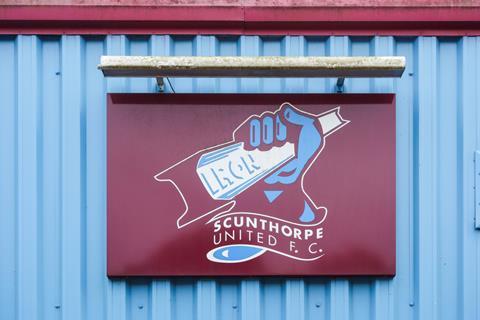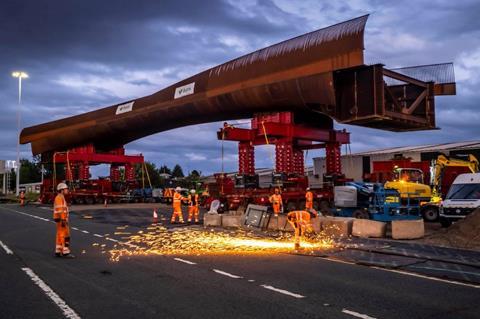The firm’s well-travelled COO on margins, a changing industry and the Iron (Scunthorpe United to you and me)
One for the older readers, perhaps, but John Wilkinson has a pub quiz question about his hometown football club.
“Can you name three England captains who have played for Scunthorpe United?” he asks. Now in the National League, England’s fifth tier, the team is nicknamed the Iron – a reference to the Lincolnshire town’s industrial heritage, and especially its links to the steel-making industry.
“When I was growing up,” the 54-year-old says, “there were three steelworks in the town, now’s there’s only one. Scunthorpe had around 25,000 steelworkers back then.”
Wilkinson started out as a trainee engineer at Clugtson in 1988, working and learning – finishing ONC and HNC qualifications during his time there – before later completing a construction management degree at Reading university in 2005.

“If you were from Scunthorpe, it was either Clugston or Birse,” he remembers. He spent five years at Clugston.
Both firms are no longer around. Clugston went under at the end of 2019 after more than 80 years in business while Birse, set up by Peter Birse in the 1970s, was bought by Balfour Beatty in 2006.
Now, more than 30 years on, he is nearly 18 months into running a £2.8bn turnover firm as chief operating officer, a newly created role, of Bam’s UK and Ireland business.
I think it was Branson who said, ‘if you’re given an opportunity and you don’t know how to do it, take it and then learn how to do it’
“I’ve been lucky and been given some great opportunities,” he says. “You always have a bit of self-doubt but I don’t know who it was – I think it was [Richard] Branson – who said, ‘if you’re given an opportunity and you don’t know how to do it, take it and then learn how to do it’.”
Wilkinson’s career has included spells at Kier and Laing O’Rourke before he took his family to Canada in 2017 to work for engineer SNC Lavalin, the Montreal-based firm probably best known in this country for buying Atkins six years ago for £2.1bn.
“A warm day in Montreal in the winter was minus 12, but then in the summer you had temperatures into the 40s.”
He enjoyed it, but illnesses in his wife’s family threw the spotlight on how far they were away from the UK, and especially Lorie’s native North-east.
He spent three years in Canada before relocating back to Europe to work for Bam, initially in charge of its civils business at the firm’s headquarters at Bunnik, near Utrecht, in the Netherlands.
At the time, Bam was undergoing a major rejig – shutting its international business, pulling out of Germany and closing bits of its Belgium business – to focus on three core geographies: its native Netherlands, along with the UK and Ireland.
Under this, the new COO post was created and Wilkinson is now in charge of 5,500 people and reports into chief executive Ruud Joosten. He also sits on a four-man executive committee that includes Joosten, the chief financial officer, Frans den Houter, and Wilkinson’s equivalent in the Netherlands, Joost Nelis.
Bam has a target called five and five which, unpicked, is a €5bn (£4.4bn) turnover and an operating margin of 5%.
The issue of margins, and what is a realistic return, has long vexed the industry and Wilkinson says: “We need to be profitable and sustainable as a business [in order to] invest in innovation and all those good bits and pieces.
If you’re only focused on price, that’s when people take shortcuts
“Do you want to work for a client who only values you because you can pour a cubic metre of concrete for a quid cheaper than somebody else? In the nicest possible way, no. They are not the sort of clients I want to work for.
“I want to work for clients who recognise we need to make a reasonable return but, at the same time, also recognise they can trust us to do what we say we’re going to do and give them a quality end product. If you’re only focused on price, that’s when people take shortcuts.”

Wilkinson says clients and contractors need to work out beforehand what is fair in terms of risk. “There is always risk in the project until you have completed the design. Design is everything…
“Once the design is completed, then we should be on the hook to deliver the production rates we promised. That’s what we should be able to do.”
But he says some clients continue to chance their arms and try and load too much risk onto the contractors. “There are things that are out of our control. Yes, we have to demonstrate value for money, but who could have predicted the inflation rates we’re seeing and the impact of covid and war?”
He says he has seen some terms where clients have tried to write in frankly impossible demands. “I can be cost predictable in the things we can control; where I can’t commit is with these clients who say, ‘covid was one thing so we want you to take all the pandemic risk moving forward’. I can’t predict that.
“How are you ever going to price in something like that? And, if you do, then you become unaffordable so you are basically wasting your time.”
If you’re working on margins of 2%, then your ability to invest is limited
Mark Robinson, the head of procurement specialist Scape, recently told this magazine that mandating margins on public sector contracts would mean everyone could concentrate on doing the best job possible, without needless argy-bargy before, during and after a job.
“I could very much support that,” Wilkinson says. “If you’re working on margins of 2%, then your ability to invest is limited. We seem to fail to fundamentally grasp that predictability of return for everybody is really, really important.”
He would like to see the government adopt a more long-term strategy towards construction so that those working in it can get surety of work. And he says too much time is still spent talking about jobs, rather than getting on and building them.
He says Crossrail, now called the Elizabeth line, is the perfect example of this. Bam’s civils’ arm, Nuttall, worked on the job with Kier and Spanish firm Ferrovial, a role it has reprised with the same firms and French firm Eiffage on HS2.
Crossrail ended up being late and hugely over budget, but Wilkinson says: “Crossrail was 20 years in the thinking and then it’s like, ‘give the contractors six months to price it and then get on with the build’. Our expertise is not being leveraged enough.
“Crossrail was so far at the cutting edge of technology, but you have to accept that, when you’re pushing the boundaries of technology and innovation, there are certain things you can’t predict and we don’t build enough float into this. If a project lasts 10 years, how are you going to predict what happens in years eight, nine and 10?”
While the debate about margins shows that some things have not changed too much during Wilkinson’s time in contracting, there are clear differences between when he started in the late 1980s and now.

“It was a very technical type of industry in the sense that, if you hadn’t studied physics at A level, you were never going to get on a construction-related degree course. As the industry has modernised through digital and technology, we’re employing people who have got backgrounds in things like gaming. That traditional academic route into this industry was quite important when I graduated but it’s nowhere near as important now, I don’t think.”
This has opened up avenues into a sector seen as the preserve of men. “The diversity and inclusion piece is enormous. The industry has got a lot more professional. Dare I say it, when I started if you were a carpenter and you had five fingers, you weren’t really a carpenter.
“The professional side of the industry is attracting different talent. We’re attracting a lot more females in terms of engineers. Before, it just used to be the traditional female roles like HR.”
[Gender diversity] is not my skillset but I have an obligation to improve my knowledge around that
As more and more change has appeared, Wilkinson has had to adapt as well to issues such as identity politics. “I think there’s 89 recognised ways in which people can identify now [according to the website Sexual Diversity there are 105]. I don’t need to know all 89 but I just need to understand it.
“When I joined, construction was a very stereotypical sort of industry and I came from Scunthorpe, which was full of steelworkers. [Gender diversity] is not my skillset but I have an obligation to improve my knowledge around that.”

It’s a long way, he admits, from the early days in “sunny Scunny” as it is still sometimes known. “Rugby is my sport and it’s like the All Blacks mantra of ‘leave the jersey in a better place’. I want to do that for Bam and the industry.
“The industry does so much for society and, to a degree, it’s pretty overlooked. I know I don’t know everything – and the day I convince myself I do know everything is the day I should retire.”
While the oval ball might be more his bag than the round one, he still keeps an eye out for Scunthorpe United’s results. And the answer to that pub quiz question and those England captains who turned out for the Iron?
Kevin Keegan, the late Ray Clemence and Ian Botham, the former England cricket captain, who played 11 games for the club in between batting, bowling and being a cricketing equivalent of Roy of the Rovers. A set of answers, then, to store away for the next quiz at the local.
John Wilkinson CV
Born in 1968, John Wilkinson joined Clugston in 1988 as a trainee engineer before leaving in 1993 to join civil engineer C Spencer.
He then moved to May Gurney in 2006, where he was a project director on the restoration of Robert Stephenson’s High Level Bridge, the grade I listed road and rail bridge, opened in 1849, that spans the river Tyne in Newcastle. From there it was on to running May Gurney’s infrastructure business before the firm was bought by Kier in 2013 for £221m following a tug of war with rival Costain.

Kier’s chief executive at the time of that deal, Paul Sheffield, left the following year and later joined Laing O’Rourke which saw Wilkinson join Sheffield at the country’s biggest private contractor in 2016. He only stayed a year before being recruited by SNC-Lavalin in summer 2017 initially as an executive vice president, ending up as president of its infrastructure business.
He joined Bam in 2020 as chief operating officer for its civils business, before this was broadened out to COO of its UK and Ireland business, which includes building, civils, FM and property.
Going Dutch: Bam in numbers
Headquartered in Bunnik, the Netherlands, Bam employed 13,700 people last year, according to its latest report and accounts.
Its revenue in 2022 was €6.6bn (£5.8bn), a fall of 10% on the year before after pulling out of Germany and parts of Belgium. Turnover from its core Netherlands, UK and Ireland business was up 2%. The business returned an EBITDA margin of 4.5%.
Income from its UK building business last year was up 7.5% to €1,062bn (£940m) while its biggest division, Bam Nuttall, saw turnover stay flat at €1.2bn (£1.1bn). The overall UK and Ireland business had revenue of €3.1bn (£2.7bn), a rise of 5% on 2021, with an EBITDA margin of 2.6%.

The firm’s latest report and accounts features its work to clean up the Selfridges building in Birmingham on its front cover and other notable projects it is working on include the Co-op Live Arena, being built in the shadow of Manchester City’s Etihad stadium, and the Sky Studios scheme in Elstree.
Chief executive John Wilkinson says the Bam Nuttall arm works for 12 clients, including Network Rail, where it is that firm’s third biggest supplier after EDF and Siemens, HS2 and the Environment Agency. “Civils is very strong and pretty resilient through next year as well,” Wilkinson adds. “Construction is not that dissimilar. Inflation is still there but softening. The biggest challenge is potential wage inflation. There is a war for talent in the industry.”



























No comments yet